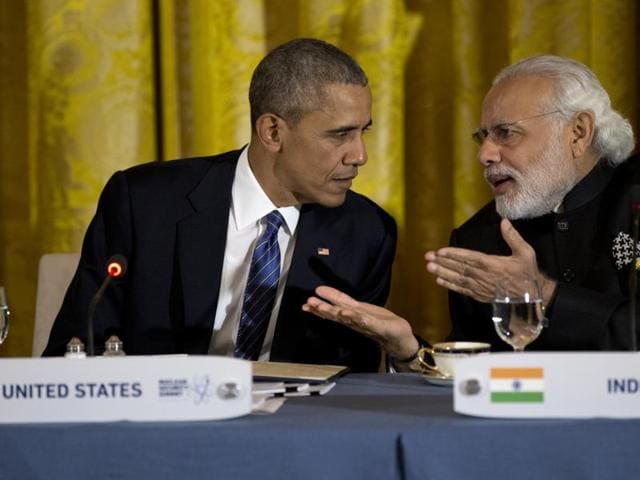Terrorism will not stop by lighting candles
If governments are serious about eradicating terrorism, they must share financial and intelligence information on terror groups with other nations
At the 2016 Nuclear Security Summit dinner hosted by US President Barack Obama on Thursday, Prime Minister Narendra Modi hit the nail on the head when he said that terrorism has become “globally networked but “we still act only nationally to counter this threat”. He added: “The reach and supply chains of terrorism are global; but genuine cooperation between nation states is not”. The PM’s statement came a day after China and Pakistan blocked the entry of banned Jaish-e-Mohammed (JeM) chief Masood Azhar into the 1267 sanctions list of the United Nations for links with al-Qaeda and its affiliates.

Azhar, an Islamic jihadist ideologue, has been targeting India since he was released in exchange for hostages in the Indian Airlines IC-814 hijack at Kandahar, Afghanistan, on December 31, 1999. Even though Pakistan admitted that the JeM was involved in the attack on the Pathankot air base on January 2, the Chinese veto shows the clout Azhar has in the Pakistani establishment, particularly the Inter-Services Intelligence that supported him indirectly at Kandahar.
Read | Nuclear security must remain abiding national priority: PM Modi in US
Cut to the Brussels bombing on March 22: One of the accused — Abderrahman Ameroud — served a seven-year prison term for helping two Tunisian-born Belgium nationals — who lived in the Muslim-dominated Molenbeek area of the city — to assassinate Afghan Northern Alliance leader Ahmad Shah Massoud in the Panjshir Valley two days before the 9/11 attacks in the US.
Massoud’s assassination was carried out at the behest of al-Qaeda chief Osama bin Laden in support of the Pakistan-sponsored Taliban that ruled Afghanistan in 2001. Massoud was its arch rival. Bin Laden threw a lavish party for Azhar in Taliban-occupied Kandahar after his release.
Pakistan’s footprint in Massoud’s assassination is evident as the attackers were issued multiple entry visas by its embassy in Brussels and even the meeting with the commander was arranged thanks to Islamabad’s shadowy friends in Afghanistan.
Read | PM Modi in US: Here’s why Nuclear Security Summit is important for India
These incidents show that terrorism is the same across the world but is marketed under different brand names. The ideology of the terror groups is more or less the same but the new groups are much more rabid, violent and extreme in their actions. This attitudinal change is best exemplified by the Islamic State (IS) through beheading, rape and mass murder.
The prime minister has exposed the faultlines in the fight against terrorism by asking for a global response as the terror-hit European countries used to preach human rights and pacifism to India when New Delhi sought their support in the fight in the past two decades during counter-terrorism (CT) dialogues. Even when the Chinese were told before the attacks in Xinjiang province that the East Turkestan Independence Movement (ETIM) jihadists were being trained in Pakistan, the Indians were politely told that it was an issue between two all-weather friends. Pakistan, which was forced into jihad in 1979 over the fear of the erstwhile Soviet Union seeking a warm water port in Karachi after annexing Afghanistan, has also become a victim of terror.
Read | Pakistan JIT probing Pathankot attack records witnesses’ statements
With the world’s largest NGO, the United Nations, ineffective and irrelevant in the fight against terrorism, the time has come for the big powers to bury their hatchets and start sharing financial and intelligence information on the terror groups with other governments.
With the terror-training universities shifting out from the Af-Pak area to Iraq and Syria, the big powers must push for a reconciliation between Sunni Saudi Arabia and Shia Iran. It is this rift that is tearing West Asia apart and aiding terror groups.
Modi will get an opportunity to address the issue during his April 3 visit to Saudi Arabia as India has good ties with both countries. Saudi Arabia can play a constructive role in the war against terrorism by not exporting its brand of puritan Wahhabi ideology along with zakat donations and radicalising other countries.
This concern was highlighted by Krgyzstan President Almazbek Atambayev when he told Modi last year that accepting zakat donations from Saudi Arabia and Pakistan has been banned in his country.
Many believe that the radicalisation of Muslims in Belgium was initiated at the behest of Wahhabi imams from Saudi Arabia who preached at Brussels Grand Mosque, which was constructed in 1967 as part of an oil deal with the House of Saud. The unemployed and marginalised Muslim youth in Europe, particularly in France and Belgium, turned to radical Islam in order to assert their identity even at the cost of harming the global diversity of the religion.
There are no free lunches in this fight against terror for economically driven societies and eradicating it cannot be the responsibility of a few countries. This virus can be eliminated only when all countries — cutting across ideological and religious lines — are prepared for a long haul in the frontline trenches. State-sponsorship of terrorism for political objectives must cease as a first step in the war against terror. Each thread in every terror investigation must be pursued to its logical conclusion. The answer to terror does not stop by lighting candles after carnages. It only begins.
shishir.gupta@hindustantimes.com




